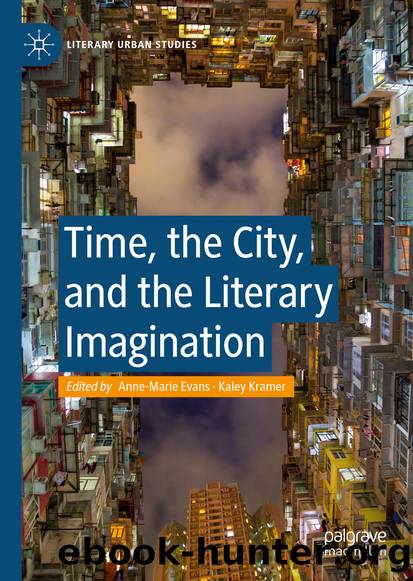Time, the City, and the Literary Imagination by Unknown

Author:Unknown
Language: eng
Format: epub
ISBN: 9783030559618
Publisher: Springer International Publishing
The Magistrate goes on to explain that in Bindura, âone only had to cross Chipindura Road from the east or Chipadze Road from the north into the high density suburbs to find the sun fierce and angryâ (Huchu 2015, 18) whereas the sun is âwondrous, a joyful gift warmth and lightâ (Huchu 2015, 18) in the wealthier low-density suburbs. This indication that even within the same small city, the experience of time and space can differ greatly is one of the reasons I prefer to describe this novel (and others) as translocal rather than transcultural, transnational or global: Huchu here acknowledges and overtly deals with the local-local connections across varying distances and scales. A translocal layering of different suburbs of the same city can yield as many interesting similarities and contrasts as a translocal connection that reaches across national and even continental borders. As Maria Ridda explains: âthe chronotope dismantles the holistic constructions of the nation to signify a wider space that contains multiple layers of time and extends beyond national bordersâ (Ridda 2015, 28).
In creating the routine of a daily long walk, the Magistrate performs a ritual to access these extended layers of time. This process relates to Benjaminâs perception of the urban palimpsest as affecting the flâneur through superposition.3 While opinions differ on whether superposition is initiated by space, by the walker himself or by the text, Gurrâs explanation that âsuperposition refers to both the temporal layering and to the ability to perceive itâ (Gurr 2015, 30) is congruent with the Magistrateâs relationship to the translocal urban palimpsest:He found he could clear his mind when walking. It was as though the act of perambulation was complemented by a mental wandering, so he could be in two, or more, places at the same time. His physical side being tied to geography and the rules of physics, his mental side free to wander far and wide, to traverse though the past, present and future, free from limits, except the scope of his own imagination. (Huchu 2015, p. 13)
Download
This site does not store any files on its server. We only index and link to content provided by other sites. Please contact the content providers to delete copyright contents if any and email us, we'll remove relevant links or contents immediately.
The Power of Myth by Joseph Campbell & Bill Moyers(1049)
Half Moon Bay by Jonathan Kellerman & Jesse Kellerman(979)
Inseparable by Emma Donoghue(976)
A Social History of the Media by Peter Burke & Peter Burke(968)
The Nets of Modernism: Henry James, Virginia Woolf, James Joyce, and Sigmund Freud by Maud Ellmann(890)
The Spike by Mark Humphries;(805)
The Complete Correspondence 1928-1940 by Theodor W. Adorno & Walter Benjamin(773)
A Theory of Narrative Drawing by Simon Grennan(773)
Culture by Terry Eagleton(770)
Ideology by Eagleton Terry;(731)
World Philology by(711)
Farnsworth's Classical English Rhetoric by Ward Farnsworth(710)
Bodies from the Library 3 by Tony Medawar(707)
Game of Thrones and Philosophy by William Irwin(707)
High Albania by M. Edith Durham(697)
Adam Smith by Jonathan Conlin(685)
A Reader’s Companion to J. D. Salinger’s The Catcher in the Rye by Peter Beidler(675)
Comic Genius: Portraits of Funny People by(648)
Monkey King by Wu Cheng'en(645)
